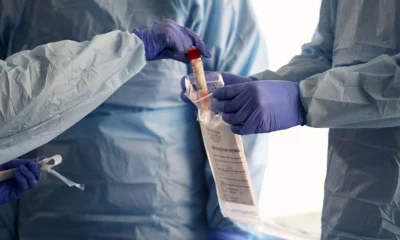When determining how many calories you should burn in a given day, the main determining factor depends on your weight loss goals, i.e., do you want to maintain your current weight or work toward a cumulative gain or loss?
The mathematics of calories in vs. calories out is relatively simple in theory; however, there are many variables in reality. Check out a calorie calculator to help you. The very essence of life revolves around change, and no day is exactly like another.
Likewise, dormant calorie burning and how generally active you are on a given day will affect how your body burns energy. Ultimately, the answer depends on the supply and demand of available calories compared to how many your body utilizes throughout a twenty-four-hour period.
What Is a Calorie?
A calorie is a unit of heat energy. So, when we talk about “burning calories,” it isn’t just colorful language. The body must use (burn) calories to produce the energy it needs to perform.
One cal (with a small “c”) is the energy needed to raise one gram of water one degree Celsius. When discussing diet, one Cal (with a capital “C”) equals 1,000 cal or one kilocalorie.
The calories you burn each day generally come from the sugar glucose. The metabolic pathways known as the Krebs Cycle, along with Oxidative Phosphorylation, convert sugar into ATP (adenosine triphosphate) and ADP (adenosine diphosphate) for immediate use. It takes a lot of molecular energy to fuel a human organism. But what happens if you don’t burn enough calories each day? Or if you burn too many?
A fundamental law of physics says that energy cannot be created nor destroyed; it can only change form. Metabolism is when the heat in calories changes biochemically to provide the necessary power for homeostasis.
Calories consumed undergo a bimolecular change with oxygen. This resulting substrate is essential in forming compounds that produce usable energy molecules. These energy units include ADP and adenosine triphosphate.
Not All Calories are Equal
A feedback mechanism signals when the body has produced enough energy to meet its needs. Then, it sends any remaining glucose to the muscle and the liver, which convert it into glycogen.
Glycogen is a glucose polysaccharide, a chain of connected glucose molecules. When dietary sugar isn’t available for immediate demand, the body uses this glycogen store.
When the liver and muscle have stored as much glycogen as possible, metabolism turns any remaining glucose into triglyceride, a low-density lipid. The body stores this fat wherever it finds a place, for example, around the waistline or in arterial blood vessels.
When the body has no caloric input, it will metabolize the stored energy in the same order. First, it will break down the glycogen, then the lipids. When the fat stores are gone, it uses protein, primarily from muscle mass.
As you are going through this process of burning calories, a chiropractic care can help even out your body and make the journey more comfortable.
Maintaining Weight
To maintain a certain weight, the number of calories must equal the number used to maintain the resting metabolic rate (RMR). These include beating your heart, fueling the diaphragm breathing, bowel peristalsis, and blinking your eyes.
Then, add additional calories required to meet the demand of any energy needs above the basic resting rate. For example, brushing your teeth for two minutes requires 5.7 cal. A brisk ten-minute walk burns fifty cal on average but varies by weight and speed. So, getting ready for work, you burned at least 55.7 Cal.
Authorities in nutrition have generally stated that an “average” woman requires 2,000 Cal a day and an “average” man 2,500 Cal. Calculate the number of calories consumed and subtract how many calories you burned if the number is more than you are storing. If the number is less than that, you are depleting. Sounds simple; however, how many are “average?”
Losing Weight
One pound of adipose (body fat) holds 3,500 Cal. To reach a reasonable goal of an eight-pound weight loss in one month, you would need to burn an additional 933 Cal per day. (8 lbs times 3,500 Cal is 28,000 Cal divided by 30 days equals 933.33 Cal per day.)
For fifty years, conventional understanding and teaching have followed the stated formula. For example, you need to consume 500 Cal less or burn an additional 500 Cal a day to lose a pound a week. The problem is that while it looks good on paper, it doesn’t translate in real life.
Research shows that burning an additional 500 Cal a day rarely results in a 500 Cal loss. Many variables interplay with metabolism, altering the seemingly simple conversion. The metabolic influences are as diverse as genetics and the type of activity used to burn calories.
A significant flaw in the simple supposition equating calories burned to weight loss is the failure to factor in other weight loss dynamics. One factor is the dynamic nature of your Total Daily Energy Expenditure (TDEE). TDEE changes with weight loss. Consequently, relying on a simple calorie-per-pound calculation will provide variable results.
Gaining Weight
Most people without medical reasons should not need to gain weight. As long as you meet your physiologic requirements, you may be genetically predisposed to being thin, which is perfectly natural. A wasting process such as cancer or a malabsorption syndrome may require weight preservation and gain.
In that case, on a given day, your goal is to burn as few calories as possible to maintain quality of life. Allow dietary calories to replenish stores without extra metabolic burden.
The Bottom Line
There is no simple answer to how many calories you should burn in a day, as there are many factors to consider. You can meet your needs based on your desires and medical health by consulting calorie burn charts and making lifestyle changes to suit them.
Fortunately, the information you need is readily available when making a diet plan. Thanks to research, we know the caloric content of every edible. Nonetheless, you may spend much of your time making estimates, so be careful when planning means erring on the side of caution.
Awareness of your body is essential; you need to understand your metabolism and capabilities, pandering to your strengths. With careful eating and appropriate exercise, you can achieve your end goal. Exercising can be simple and achievable at any time of the day with Lifespan Fitness equipment.
Must See
-




Other Sports
/ 4 months agoTransfer: Galatasaray target January move for Onyedika
Turkish Super Lig champions Galatasaray are lining up a January move for Club Brugge...
By Amaka Esther -




Other Sports
/ 4 months agoMan Utd too big for you – Ten Hag told to leave club
Former Tottenham Hotspur star, Darren Bent has claimed that Manchester United are too big...
By Amaka Esther -




Other Sports
/ 4 months agoEPL: Yorke tells Ten Hag not to allow Man Utd star near first team
Manchester United legend Dwight Yorke has told manager Erik ten Hag not to allow...
By Amaka Esther








